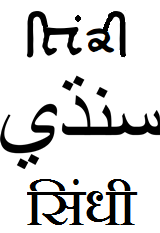Difference between revisions of "Language/Sindhi/Vocabulary/Days-of-the-Week"
m (Quick edit) |
m (Quick edit) |
||
| Line 38: | Line 38: | ||
* Person 1: سومرج توهانجي پينز فائز آهي؟ (Somarj tohanjee pinz faiz aahi?) (Did you win your match on Monday?) | * Person 1: سومرج توهانجي پينز فائز آهي؟ (Somarj tohanjee pinz faiz aahi?) (Did you win your match on Monday?) | ||
* Person 2: ناهين، مانجل کان. (Nahin, Mangal khaan.) (No, it was on Tuesday.) | * Person 2: ناهين، مانجل کان. (Nahin, Mangal khaan.) (No, it was on Tuesday.) | ||
== Practice == | == Practice == | ||
| Line 54: | Line 53: | ||
<hr>➡ If you have any questions, please ask them in the comments section below.<br>➡ Feel free to edit this wiki page if you think it can be improved. 😎 | <hr>➡ If you have any questions, please ask them in the comments section below.<br>➡ Feel free to edit this wiki page if you think it can be improved. 😎 | ||
<span link>Upon wrapping up this lesson, take a look at these related pages: [[Language/Sindhi/Vocabulary/Health|Health]] & [[Language/Sindhi/Vocabulary/How-to-Say-Hello-and-Greetings|How to Say Hello and Greetings]].</span> | |||
{{#seo: | {{#seo: | ||
|title=Sindhi Vocabulary - Days of the Week | |title=Sindhi Vocabulary - Days of the Week | ||
| Line 60: | Line 61: | ||
}} | }} | ||
==Other Lessons== | |||
== | |||
* [[Language/Sindhi/Vocabulary/Animals-in-Sindhi-Roman-Urdu|Animals in Sindhi Roman Urdu]] | * [[Language/Sindhi/Vocabulary/Animals-in-Sindhi-Roman-Urdu|Animals in Sindhi Roman Urdu]] | ||
* [[Language/Sindhi/Vocabulary/Days-of-the-week|Days of the week]] | * [[Language/Sindhi/Vocabulary/Days-of-the-week|Days of the week]] | ||
| Line 72: | Line 72: | ||
* [[Language/Sindhi/Vocabulary/Education|Education]] | * [[Language/Sindhi/Vocabulary/Education|Education]] | ||
* [[Language/Sindhi/Vocabulary/Resources|Resources]] | * [[Language/Sindhi/Vocabulary/Resources|Resources]] | ||
<span class='maj'></span> | <span class='maj'></span> | ||
| Line 79: | Line 78: | ||
{{Sindhi-Page-Bottom}} | {{Sindhi-Page-Bottom}} | ||
<span links></span> | |||
Latest revision as of 22:22, 27 March 2023
Hi Sindhi learners! 😊
In this lesson, we will be learning about the days of the week in Sindhi. Knowing the days of the week is important for daily interactions and scheduling. Don't forget to practice with native speakers on Polyglot Club. Find native speakers and ask them any questions!
Days of the Week[edit | edit source]
In Sindhi, the days of the week are based on the names of celestial bodies in the solar system. The days of the week in Sindhi are as follows:
| Sindhi | Pronunciation | English |
|---|---|---|
| سومرج (Somarj) | Sōmr̥̄j | Monday |
| منگل (Mangal) | Maṅgal | Tuesday |
| بدھ (Budh) | Bud̪h̪ | Wednesday |
| جئيندڙ (Jiindir̥̄) | Jīndr̥̄ | Thursday |
| جمعو (Jummo) | Jummō | Friday |
| ڇنڇر (Cẖancar) | Cạ̃cara | Saturday |
| اڱل (Aqal) | Aqala | Sunday |
It is important to note that the Sindhi language is written from right to left, so the names of the days are also written in that direction.
Examples[edit | edit source]
Here are a few examples of how to use the days of the week in context:
- Person 1: سومرج توهانجي پينز فائز آهي؟ (Somarj tohanjee pinz faiz aahi?) (Did you win your match on Monday?)
- Person 2: ناهين، مانجل کان. (Nahin, Mangal khaan.) (No, it was on Tuesday.)
Practice[edit | edit source]
To practice using the days of the week in Sindhi, try these exercises:
1. Translate the following sentence into Sindhi: "My favorite day of the week is Friday." 2. Ask a native Sindhi speaker what they did last Thursday. 3. Use the days of the week to make a schedule for your upcoming week.
Conclusion[edit | edit source]
Learning the days of the week in Sindhi is essential for practical communication. Use the examples and table above to improve your understanding of the vocabulary, and don't forget to practice with native speakers on Polyglot Club.
➡ If you have any questions, please ask them in the comments section below.
➡ Feel free to edit this wiki page if you think it can be improved. 😎
Upon wrapping up this lesson, take a look at these related pages: Health & How to Say Hello and Greetings.
Other Lessons[edit | edit source]
- Animals in Sindhi Roman Urdu
- Days of the week
- How to say Good Bye?
- Count to 10
- Clothes
- Fruits
- Restaurant
- Basic phrases
- Education
- Resources
Sources[edit | edit source]
